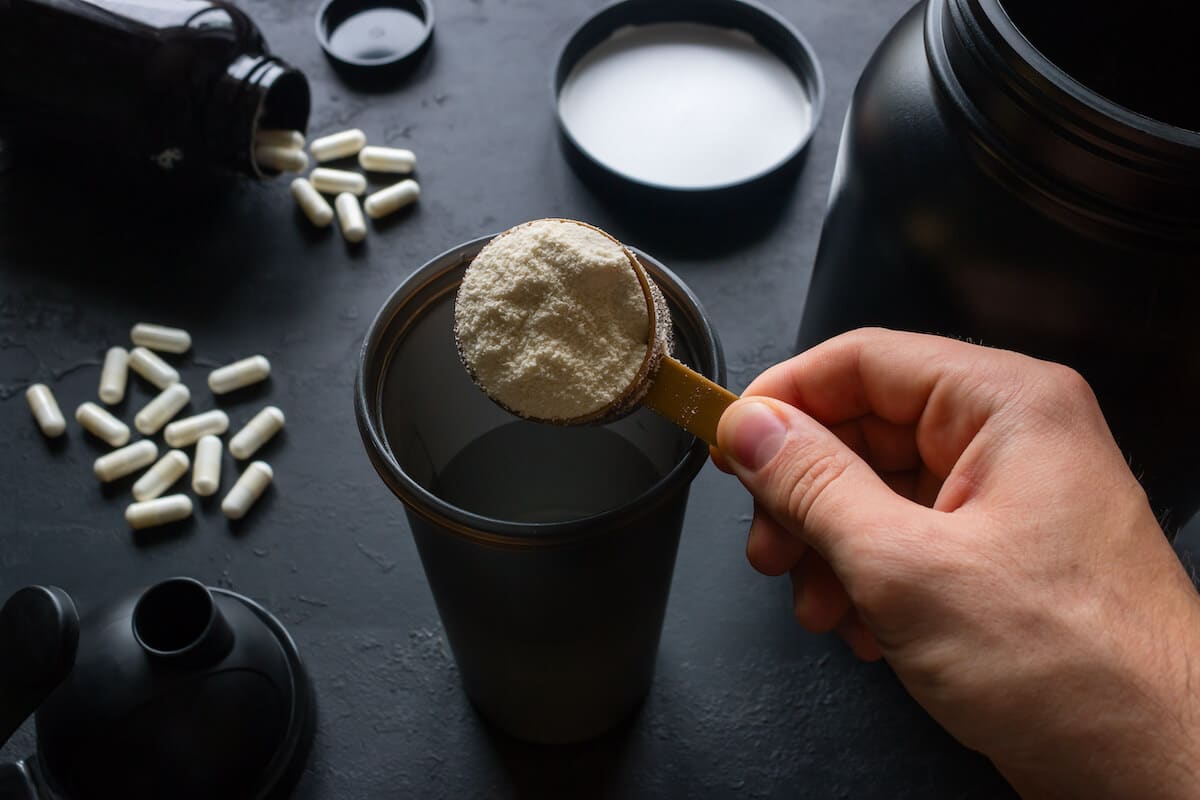
16 Sep When to Take Amino Acids and Why You Need Them
If you’re involved in athletics or bodybuilding, chances are you’ve probably heard a lot about when to take amino acids. There’s no doubt that amino acids are critical to help your body function, especially if you’re looking to optimize your performance on the field, in the gym, or elsewhere. But when to take amino acids is a subject of debate. Some swear by taking them pre-workout while others prefer during or after a workout.
Before you can decide when to take amino acids though, you need to have a clear understanding of the role they play in your fitness and wellness goals. Let’s take a closer look at how amino acids work, why you need them, and what to consider when taking them.
What Are Amino Acids?
Amino acids are the basic building blocks of protein. Among many other functions, protein provides the structure for just about everything in your body, from your cells through to your organs, bones, muscles, skin, hair, and nails. Your body also needs protein to provide energy; produce enzymes, neurotransmitters, and hormones; manage blood glucose; digest your food; and regulate your immune system. In short, without the amino acids that make up protein, your body cannot function.
Types of Amino Acids
Amino acids fall broadly into one of two groups — non-essential and essential amino acids — depending on whether or not your body can make them. There’s also a subcategory of essential amino acids called branched-chain amino acids. Here’s a closer look at all of them.
Non-Essential Amino Acids
Your body can make non-essential amino acids from other amino acids. The non-essential amino acids are:
- Glutamine
- Glutamic acid
- Arginine
- Glycine
- Asparagine
- Serine
- Alanine
- Aspartic acid
- Proline
- Cysteine
- Tyrosine
Essential Amino Acids (EEAs)
Essential amino acids are those your body cannot make. Instead, you need to get them from your food and nutrition, particularly your protein intake. To access and use the amino acids in protein, your digestive system breaks down the protein into its component amino acids then recombines them through a process known as protein synthesis.
The essential amino acids are:
- Valine
- Leucine
- Isoleucine
- Tryptophan
- Histidine
- Methionine
- Lysine
- Threonine
- Phenylalanine
Branched-Chain Amino Acids (BCAAs)
Three essential amino acids — leucine, isoleucine, and valine — are known as branched-chain amino acids (BCAAs), due to the branched side-chain in their molecular structure.
While they have many important functions, these three are particularly popular with athletes and bodybuilders. According to The Journal of the International Society of Sports Nutrition (and many others) the essential amino acids derived from protein, combined with resistance exercise, are especially important for muscle protein synthesis.
Branched-chain amino acids are also extremely useful for older adults who may be losing muscle mass (this is known as sarcopenia). Sarcopenia has many repercussions including weakness and an increased risk of breaking bones. Building muscle can help to counteract this degenerative process.
How Amino Acids Work
Amino acids have an anabolic effect, meaning they help build muscle (among other things, as we’ve mentioned), especially when combined with resistance training.
On the other side of the equation, when you exercise, an opposite, catabolic process happens. Essentially, your body needs fuel to keep up your energy. If there aren’t energy stores readily available, your body breaks down muscle to access the glycogen stored there and you may end up with a negative protein balance.
You then need recovery time — and plenty of amino acids to help restore a positive protein balance — to repair and rebuild that muscle.
However, if you take amino acids, and especially BCAAs, before, during, and/or after your workout, your body can easily access the energy it needs without resorting to muscle breakdown.
Amino Acid Supplements

If you’re reasonably healthy and eat a varied diet of whole foods, especially high-quality protein, you can probably get most of the amino acids you need from your daily food intake.
However, your body can’t store amino acids and it can only use what’s available. Therefore, you need a regular supply to make sure your body has enough at any given moment.
If you exercise intensely and are looking to improve your athletic performance, you probably need to boost your daily amino acid intake. You could (and should) help this process by eating more complete proteins, which contain all the EAAs. But because the digestion process takes time, those EAAs won’t be immediately available for your body to use.
Of course, you can also get amino acids from a protein supplement, like whey protein powder. But if you really need an intense boost of amino acids, you might prefer a dedicated amino acid supplement.
An amino acid dietary supplement helps you quickly get enough amino acids to fuel your activities, whether that’s an intense workout or simply maximizing your day — without breaking down your muscle or adding extra calories.
BCAA Supplements
While amino acid dietary supplements will give you a good mix of all nine essential amino acids, if you’re specifically focused on keeping up your energy, building muscle mass, and/or improving recovery after intense strength or endurance exercise, a BCAA supplement might be your answer.
In a general protein supplement, like whey protein powder, BCAAs are bound to other amino acids. But when they’re taken separately, your body can more quickly digest and absorb them and then use them for protein synthesis.
Studies show that branched-chain amino acid supplementation can help to boost energy while reducing fatigue during a long and intense workout. This is because BCAAs compete with tryptophan for uptake to the brain, and tryptophan is needed to produce serotonin, the hormone that makes you feel tired.
BCAAs also help with muscle growth, while decreasing muscle damage and speeding up muscle recovery, including delayed-onset muscle soreness (DOMS).
And for older adults, BCAAs have also been shown to increase muscle protein synthesis, reducing sarcopenia (loss of muscle mass).
Not surprisingly, BCAA supplements have much higher levels of BCAAS than you would find in a general protein or even an amino acid supplement. As leucine is the “star BCAA” when it comes to muscle building, the ratio of BCAAs most commonly available in stores is 2:1:1 leucine:isoleucine:valine.
Are Some BCAA Supplements Better Than Others?
While amino acid supplements, and even BCAA supplements, have been on the market for many years, improvements in technology mean that those supplements can now be optimized. For example, Ingredient Optimized ioBCAA has been optimized to deliver results far superior to those of non-optimized BCAAs and the scientific research proves it — ioBCAA has been shown to be more bioavailable than non-optimized BCAA products. Look out for our partner products, which will soon be coming to the shelves of your local retail outlet or online store.
When to Take Amino Acids

As we’ve mentioned, the question of when to take amino acids is still under discussion. While many sports nutrition experts recommend taking them at a particular time, either pre-workout, post-workout, or intra-workout, the evidence is mixed. In fact, there is support for the theory that the window of time to maximize their effectiveness is much wider.
More research is needed, but you can probably take amino acids throughout the day if you prefer. Taking them regularly — rather than only on days you exercise — may also be important. It’s worth experimenting to see what works for you.
Amino acid supplements come in a convenient capsule or powder form, which are easy to mix with other workout supplements, like creatine or glutamine, into a shake or smoothie, or any meal you choose.
Bear in mind though that you can’t survive on amino acid supplements alone. Your body also needs the nutrients you get from a varied whole-food diet, including protein, carbohydrates, and fats, with plenty of fresh vegetables and fruit.
Should You Take Amino Acids Supplements Regularly?
When you’re training intensely or looking to build muscle and then repair it after a workout, your body needs more amino acids. When to take amino acids may be debatable, but if you take a high-quality amino acid supplement on a regular basis, it can help to support your body, without adding any extra calories. Give your body that extra boost and watch your performance soar!


